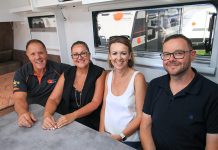Every caravan manufacturer should have an employee like Mitch Damyon. You see, aside from the fact he has dedicated a vast slice of his working life to selling Goldstream RVs, he recently bought one for himself and hit the outback road for four months with his wife – could there be any better ‘real world’ caravan R&D?
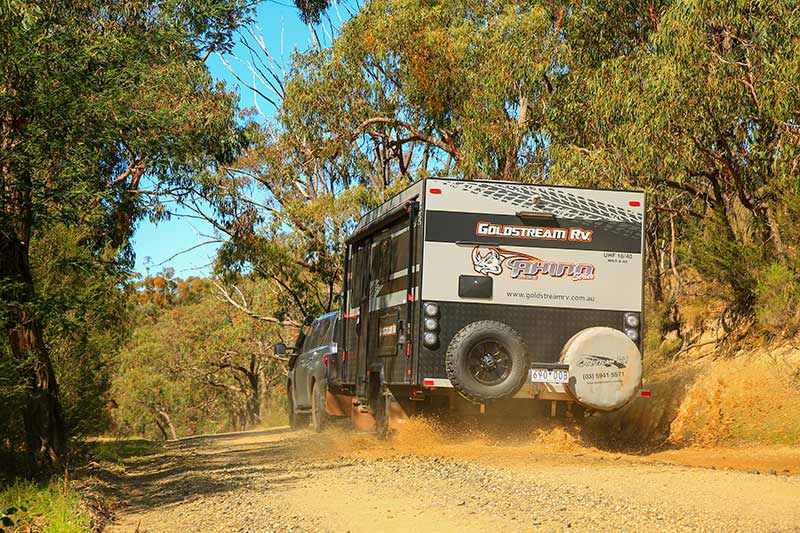 Mitch’s 1760 RE CD (rear ensuite, centre door) Rhino is a single-axle beast that became their home on wheels as they explored the Kimberley, central Australia and many more far-flung destinations.
Mitch’s 1760 RE CD (rear ensuite, centre door) Rhino is a single-axle beast that became their home on wheels as they explored the Kimberley, central Australia and many more far-flung destinations.
A few issues ago, we detailed Mitch’s van just before they headed off. Shortly after their return, we caught up with Mitch again to poke through the van. It was in its ‘raw’ state when we saw it – it hadn’t been properly cleaned or unpacked. The idea: to report on the performance of the van, find out what worked, and what needed to be replaced at the end of their 22,000km trip.
OODNADATTA AND FAR BEYOND
“The van stood up to everything we threw at it, and we threw a fair bit,” Mitch said. Among their adventures was the full length of the Oodnadatta Track, the Mereenie Loop, the Gibb, and various mining roads on the west coast.
“The couple of weeks we spent on the Gibb was an awesome time – so much to see, the gorges, the waterholes…. every day, you see something different,” Mitch said.
The van has a 300Ah lithium battery with a BMPRO BatteryPlus 35 HA battery management system, a 3000W inverter and 440W worth of roof-mounted solar. Mitch also had a DC-DC charger fitted to augment energy input during driving days. While the 12V system was able to run the reverse-cycle air-con, as well as any other 240V appliances, the couple only used the AC for an hour or two at a time to take the edge off the heat, while leaving enough juice in the battery for other uses.
However, using an air-fryer on one occasion depleted the battery quite significantly, Mitch said. But the roof solar, as well as using a portable panel now and then, helped to keep the battery between 90 and 100 per cent.
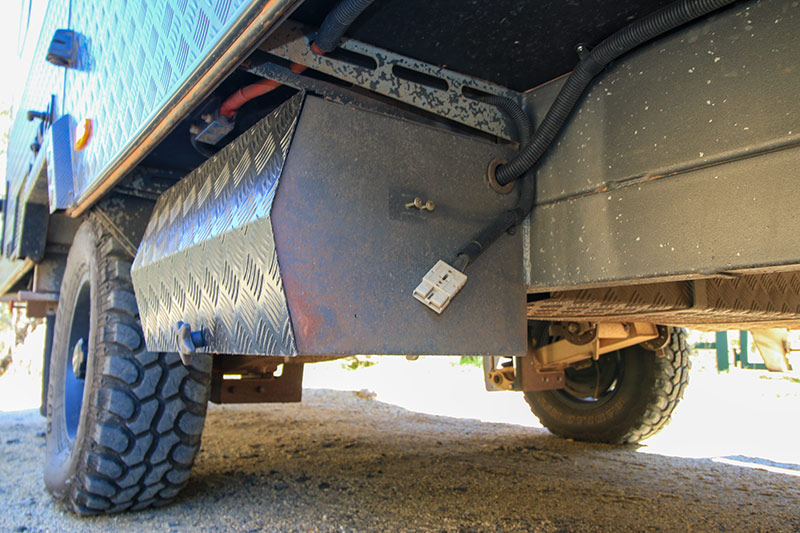
On the topic of portable panels, the Goldstream has an Anderson input mounted to the leading edge of the battery box, which itself is mounted to the offside chassis rail. However, as Mitch discovered, there wasn’t enough clearance between the plug and the battery box to allow him to connect the solar panel’s Anderson plug. One of his learnings from his trip, therefore, was that Goldstream needed to include a 10mm spacer, which would take the frustration out of connecting a portable panel. Mitch simply unscrewed the Anderson plug from the battery box when his portable panel was needed.
The 1760 RE CD features a new bathroom design from Goldstream. It includes a wall-mounted washing machine which Mitch rates highly.
“It was unbelievable – I just would not do another trip without a washing machine,” Mitch said. “The queues in caravan parks lining up to use washers are just huge. My wife said, ‘Thank you for putting that in’.”
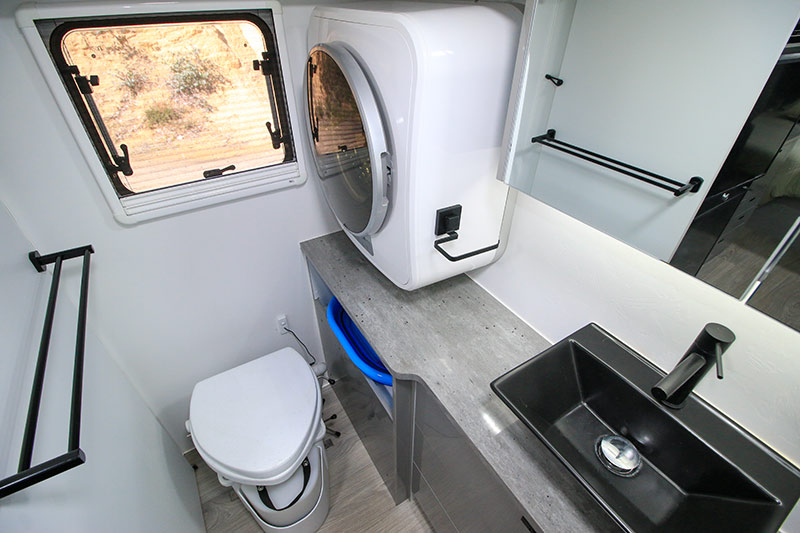
Mitch and his wife specifically fitted a Nature’s Head composting toilet to their van. As to the toilet’s efficacy, before embarking on the trip he was a tad skeptical, but he and his wife returned as true believers.
“It was the first time I’d used one, and it got emptied once in four months and probably didn’t even need emptying at that stage,” he said
As I went around the van, it was evident that it had held up well. The furniture almost looked brand new. If I seem surprised, that’s only because I’ve had microwaves lose their moorings on long corrugations and smash on the floor of the van. I’ve even had a benchtop delaminate. To be clear, I would never expect such damage from a Goldstream, but knowing the kind of terrain this van had traversed, I couldn’t help but admire the condition of the interior. Not a single cabinet door was askew.
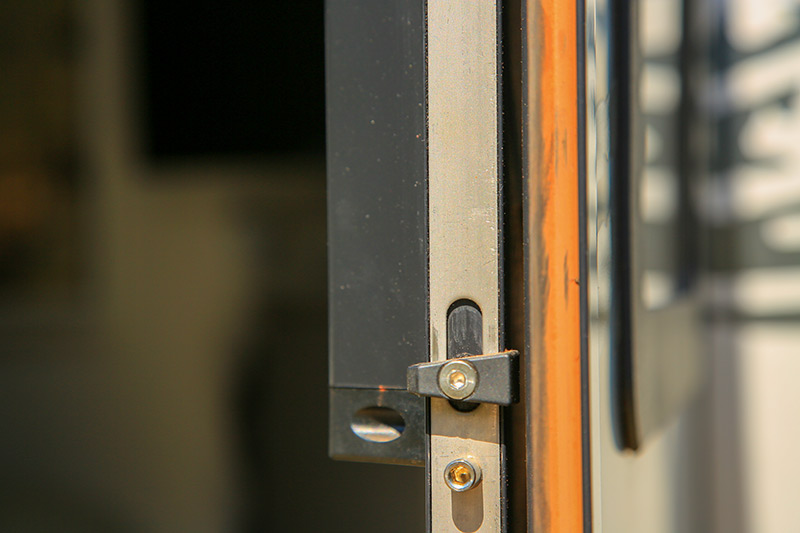
I was curious about the ARL dust suppression system Mitch had fitted. I know from experience that pressure hatches and dust suppression systems work, but there are plenty of people who view them as unnecessary. What did Mitch think?
“I wouldn’t have done the roads that I did without it,” he said.”We’d have been spending an hour or two every day wiping out dust.”
Proof of this was found on the door seal. The rubber seal around the entry door was layered in red dust, but all internal lockers and surfaces were cleaned. There wasn’t even any red dust on the internal step. Before I checked out the van, Mitch had swept the floor but had not cleaned anything else. I was impressed.
GOLDSTREAM MUD GUARDS
A few years ago, one of Goldstream’s owners, Shaun Noble, took one of his vans to Arnhem Land. But before he left, he had the idea to fit four mud guards in a line across the width of the van, just behind the A-frame. Mitch replicated this setup on his van and they looked pretty well beaten up. But as he said, better that these replaceable guards take the damage than the rest of the van. That’s the idea, after all. They worked, too – the underside of the van was still in excellent condition.
(Side note: The 1760 RE CD has a nearside slide-out for a portable barbecue, which Mitch and his wife fitted with a Ziggy Nomad. They used this barbecue almost every day and highly recommend it.)
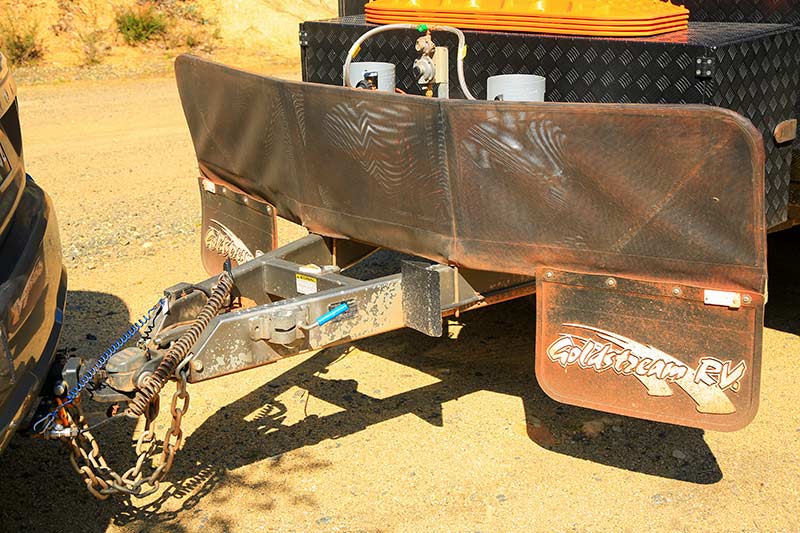
Now, outback Australia can be brutal on your equipment. Nothing demonstrates this more than the fact much of the paint had been shot-peened from the A-frame. And that’s the reality of offroad travel in Australia: steer off the bitumen for an extended period, your van will take some amount of (hopefully cosmetic) damage.
Short of using a Stone Stomper style of shield, there’s not much that can be done about paint chipping off the A-frame. Perhaps a Raptor coating? In fact, that’s Mitch’s plan to repair the paint damage: he will spray Raptor onto the A-frame and chassis members.
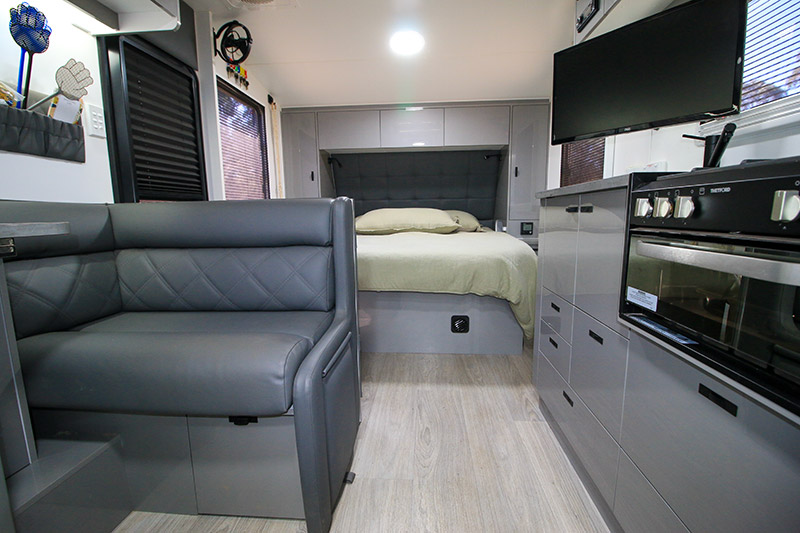
The van does have a traditional mesh guard on the A-frame, which Mitch found did a good job of protecting the gas cylinders as well as the finish of the composite aluminium cladding.
Asked whether there was anything about the van he or his wife would change, now that they’d lived in the van for four months, he said, “Definitely not. The layout worked great for us. The fact it stood up to everything we threw at it, and stood up to it well, gave us confidence. We just pointed our car in that northern direction and the van followed.”
Finally, when I first saw this van – before they departed – Mitch expressed some small uncertainty that he hadn’t opted for airbag suspension, instead fitting Cruisemaster’s ATX independent trailing arm coil setup. Now that the trip is in the rearview mirror, does he still feel that way?
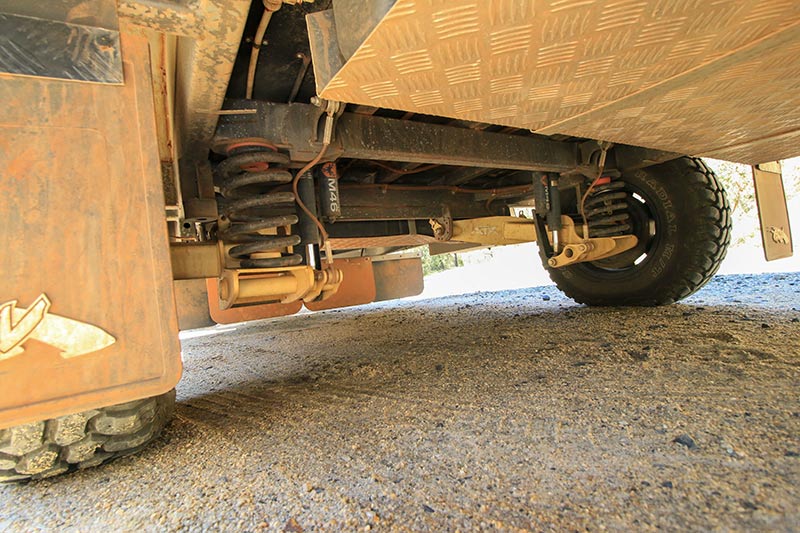
Well, as he said, there were only a couple of occasions when he felt airbags would have been handy, and even then it was only for levelling purposes on uneven sites, which he resolved anyway via a block of wood under one wheel. But throughout the trip, whether it was on the Gibb River Road or poking off the highway to find a free camp in the red dirt, the ATX performed brilliantly.
Mitch’s Goldstream 1760 RE CD weighs in at 2489kg Tare, and has an ATM of 2965kg, for a payload capacity of 476kg. Throughout their trip, their Y62 Patrol tow vehicle averaged 20.89L/100km of unleaded. Before departing for their trip, with their van fully loaded, Mitch called in to his work to use Goldstream’s scale – one of the benefits of working for a caravan manufacturer – and discovered they had 34kg left of payload capacity.
“For the best part of the trip, towing nearly 3000kg, those were fairly reasonable fuel costs,” he said.
GORV’S VERDICT
An Anderson plug that was too snug to the battery box and paint ripped off the A-frame by gravel – those were the only two things in need of attention after four months on the road touring remote Australia.
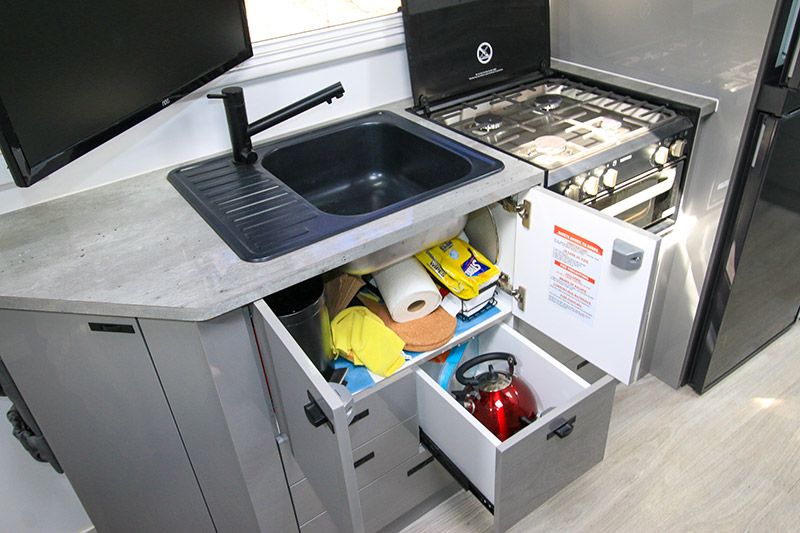 Chatting with Mitch, it was clear that he felt he had made a good decision buying a Goldstream. Of course, having worked for that company for a very long time, one might expect him to say that. But this bloke has a little more integrity than that. As does the team running Goldstream, for that matter. His experience also accords with my own experience towing and living in a Goldie.
Chatting with Mitch, it was clear that he felt he had made a good decision buying a Goldstream. Of course, having worked for that company for a very long time, one might expect him to say that. But this bloke has a little more integrity than that. As does the team running Goldstream, for that matter. His experience also accords with my own experience towing and living in a Goldie.
His van looked almost new. Sure, it was in need of a good clean, but aside from what I’ve already mentioned, nothing was broken, dented or otherwise damaged.
Finally, Mitch’s experience with his 12V system was a refreshing reminder that, while it would be lovely to have 700Ah worth of batteries and 1000W of solar, if you’re sensible with your energy usage, you can manage on much less. After all, it wasn’t that long ago when all new vans were supplied with a single 100Ah lead-acid deep-cycle battery – and that was considered state of the art!
The Goldstream RV 1760 RE CD Rhino is clearly a tough, comfortable caravan. You don’t need to take my word for it: the proof, as they say, is in the pudding.
WEIGHTS
Tare: 2489kg
GTM: 2700kg
ATM: 2965kg
Unladen ball weight: 265kg
MORE INFORMATION




